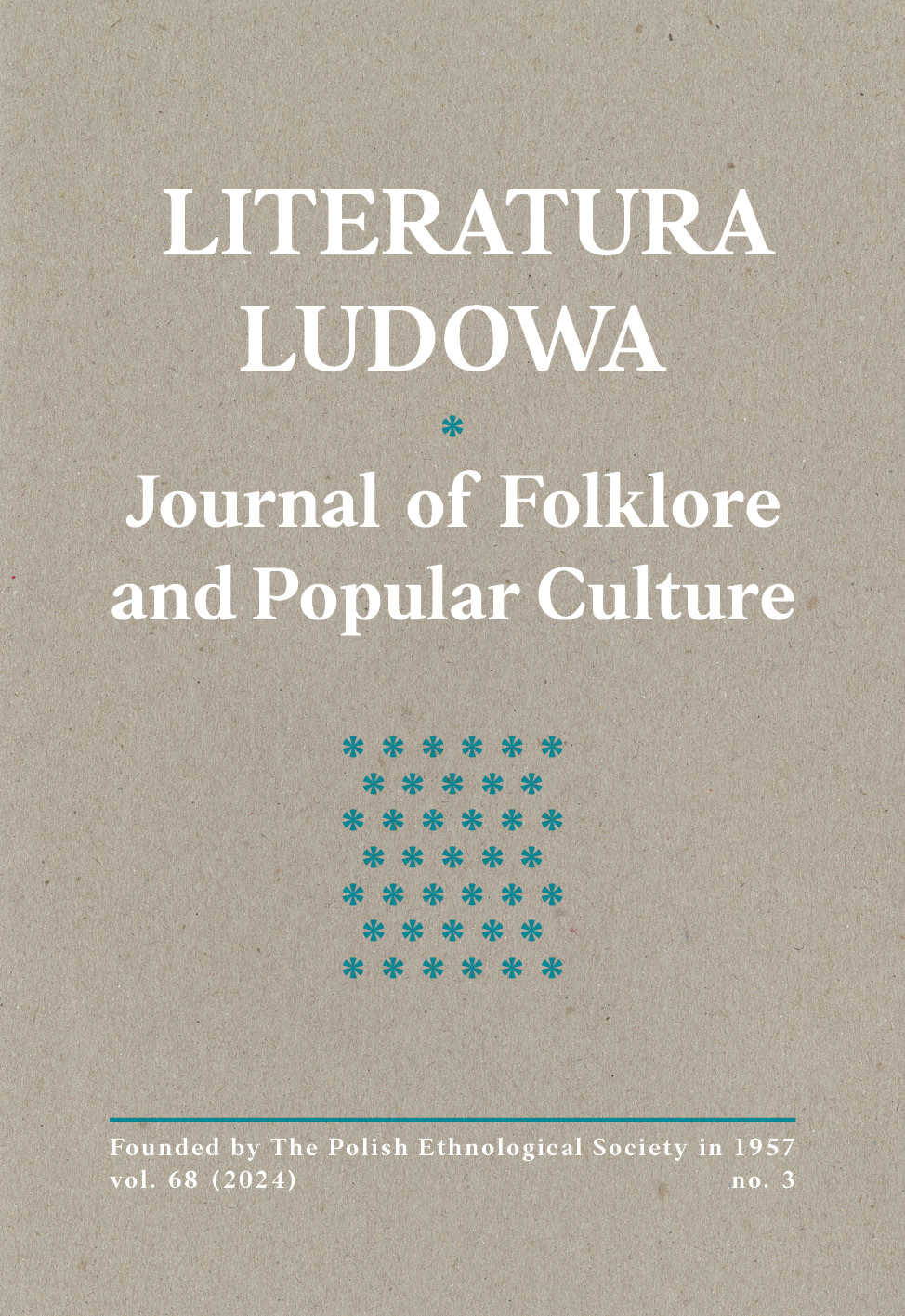Stani – kilka słów o internetowych fandomach muzycznych
DOI :
https://doi.org/10.12775/LL.3.2024.006Mots-clés
fani muzyki, fandomy muzyczne, stani, afekt, kultura konsumpcyjnaRésumé
Wraz z rozwojem nowych mediów środowiska fanowskie uległy rozproszeniu i upowszechnieniu. Bycie fanem muzyki jest powszechnie używanym kolokwializmem. W związku z tym od ponad dziesięciu lat w środowisku fanów muzyki możemy zaobserwować zmianę dyskursywną w postaci wyłonienia się z kategorii stana. W tym artykule autorka podejmuje się prześledzenia tej zmiany oraz zastanawia się, dlaczego fani muzyki czuli potrzebę, aby ta nowa kategoria zaistniała. W tym celu przedstawia afektywne i konsumenckie zaangażowanie stanów, które może stanowić wyróżnik pomiędzy stanami a fanami.
Références
Banerjee, U. (2023, 26 lutego). BTS: Jungkook’s privacy under threat? ARMY urges Big Hit Music to take action as alleged sasaeng claims access to his private information and videos. Bollywoodlife. https://www.bollywoodlife.com/hollywood/bts-jungkooks-privacy-under-threat-army-urgesbig-hit-music-to-take-action-as-alleged-sasaeng-claims-access-to-his-private-information-andvideos-korean-entertainment-news-2353037/
Booth, P. (2015). Playing Fans: Negotiating Fandom and Media in the Digital Age. University of Iowa Press. http://doi.org/10.1353/book38201
Czachor, M. (2018, 18 czerwca). Ariana Grande Shut Down A Fan Dissing Her Relationship With Pete Davidson & It’s So, So Perfect. Bustle Entertainment. https://www.bustle.com/p/ariana-grandes-response-to-a-fan-calling-her-dumb-on-twitter-shows-shes-not-here-for-herrelationship-haters-9432676
Cavicchi, D. (1998). Tramps Like Us: Music and Meaning Among Springsteen Fans. Oxford University Press.
Cavicchi, D. (2007). Loving Music Listeners, Entertainments, and the Origins of Music Fandom in Nineteenth-Century America. In J. Gray, C. Sandvoss, C. Harrington (eds.), Fandom Identities and Communities in a Mediated World (pp. 109–126). New York University Press. https://doi.org/10.18574/nyu/9781479845453.003.0009
Coscarelli, J. (2020, 25 grudnia). How Pop Music Fandom Became Sports, Politics, Religion and All-Out War. The New York Times. https://www.nytimes.com/2020/12/25/arts/music/pop--music-superfans-stans.html
Dilling-Hansen, L. (2015). Affective fan experiences of Lady Gaga. Journal of Transformative Works and Cultures, 20, [no pagination]. https://doi.org/10.3983/twc.2015.0662
Duffet, M. (2013). Understanding Fandom: An Introduction to the Study of Media Fan Culture. Bloomsbury Academic.
Duffett, M. (2014). Introduction. In Duffet M. (ed.), Popular Music Fandom. Identities, Roles and Practices (pp. 1–16). Routledge.
Ferris, K. O., Harris, S. R. (2011). Stargazing: Celebrity, Fame, and Social Interaction. Routledge.
Grossberg, L. (1992), The Affective Sensibility of Fandom. In L. A. Lewis (ed.). The Adoring Audience. Fan Culture and Popular Media (pp. 50–65). Routledge.
Hawgood, A. (2011, 5 października). Scratching the Celebrity Itch. The New York Times. https://www.nytimes.com/2011/10/06/fashion/scratching-the-celebrity-itch.html
Hills, M. (2001). Virtually Out There: Strategies, Tactics and Affective Spaces in On-Line Fandom. In S. Munt (ed.), In Technospaces: Inside the New Media (pp. 147–160). Continuum.
Holt, B. (2020, 7 lutego). “Stans” have changed what it means to be a music fan—for better and worse. Quartz. https://qz.com/1788143/stans-have-changed-what-it-means-to-be-a-music-fan/
Horton, D., Wohl, R. R. (1956). Mass communication and para-social interaction; observations on intimacy at a distance, Psychiatry, 19(3), 215–229. https://doi.org/10.1080/00332747.1956.11023049
Jenkins, H. (1992). Textual Poachers: Television Fans and Participatory Culture. Routledge. https://doi.org/10.4324/9780203114339
Kamphof, I. (2011). Webcams to Save Nature: Online Space as Affective and Ethical Space. Foundations of Science, 16(2–3), 259–274. https://doi.org/10.1007/s10699-010-9194-7
Kobus, A. (2018). Fandom. Fanowskie modele odbioru. Wydawnictwo Naukowe UMK.
Koreaboo (2023, May 15th). ARMY Urges HYBE To Protect BTS’s Jungkook After Alarming Death Threats. Koreaboo. https://www.koreaboo.com/news/bts-jungkook-death-threats-hybe-protect/
Lamerichs, N. (2015). Express Yourself: An Affective Analysis of Game Cosplayers. In J. Enevold, E. MacCallum-Stewart (ed.), Game Love: Essays on Play and Affection (pp. 126–149). McFarland& Company, Inc., Publishers.
Lee, J. H., Nguyen, A. T. (2020). How Music Fans Shape Commercial Music Services: a Case Study of BTS and ARMY. In Proceedings of the 21st ISMIR Conference, Montreal, Canada, October 11–16, 2020 (pp. 837–845). https://program.ismir2020.net/poster_6-09.html
Madden S. (2019, October 17th). The 2010s: Social Media And The Birth Of Stan Culture [podcast]. NPR. https://www.npr.org/2019/10/07/767903704/the-2010s-social-media-and-thebirth-of-stan-culture?t=1609653487619
McCormack, T. (2023, August 1st). Billboard Top 100 Chart: What Is It, How Is It Calculated, and How To Access It. Tune My Music. https://blog.tunemymusic.com/billboard-top-100-chartwhat-is-it-how-is-it-calculated-and-how-to-access-it/
Melas, C. (2017, May 15th). Nicki Minaj pays off thousands in fans’ student loans, tuition. CNN Entertainment. https://edition.cnn.com/2017/05/15/celebrities/nicki-minaj-pays-students.
Merriam-Webster (b.d.). Stan. In Merriam-Webster.com. Retrieved: March 20, 2023 from https://www.merriam-webster.com/dictionary/stan
Min, K., Kim, M. (2018). Ulotka projektu #PurpleRibbonARMY [fotografia]. Dispatch. https://newsfeed.dispatch.co.kr/1317849#_PA
Mydzik, B. (2017). O niektórych konsekwencjach zwrotu afektywnego w badaniach kulturowych. Annales Universitatis Mariae Curie-Skłodowska Lublin. Educatio Nova, 2, 115–128. http://dx.doi.org/10.17951/en.2017.2.115
Nas. (2001). Eather [piosenka]. On Stillmatic. Columbia Records; Ill Will Records.
Siuda. P. (2010). Od dewiacji do głównego nurtu – ewolucja akademickiego spojrzenia na fanów, Studia Medioznawcze, 3(42), 87–99.
soshijack (2022, April 19th). The “I’m not a ____ stan but” “not a huge fan of ___ but” is so unnecessary when complimenting a group/artist [wpis na forum internetowym]. Reddit. https://www.reddit.com/r/unpopularkpopopinions/comments/u6q2ci/the_im_not_a_stan_but_not_a_huge_fan_of_but_is_so/
Stevenson, N. (2006). David Bowie: Fame, Sound and Vision. Polity Press.
US BTS ARMY (b.d.). Guide to streaming & Purchasing. Usabtsarmy. https://www.usbtsarmy.com/stream-purchase-guide
Téléchargements
Publiée
Comment citer
Numéro
Rubrique
Licence

Ce travail est disponible sous licence Creative Commons Attribution - Pas de Modification 4.0 International.
1. The authors give the publisher (Polish Ethnological Society) non-exclusive license to use the work in the following fields:a) recording of a Work / subject of a related copyright;
b) reproduction (multiplication) Work / subject of a related copyright in print and digital technique (ebook, audiobook);
c) marketing of units of reproduced Work / subject of a related copyright;
d) introduction of Work / object of related copyright to computer memory;
e) dissemination of the work in an electronic version in the formula of open access under the Creative Commons license (CC BY - ND 3.0).
2. The authors give the publisher the license free of charge.
3. The use of the work by publisher in the above mentioned aspects is not limited in time, quantitatively nor territorially.
Stats
Number of views and downloads: 445
Number of citations: 0



